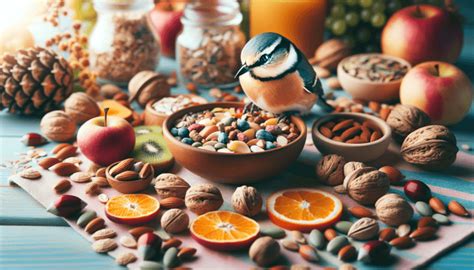Understanding Avian Nutritional Needs
Birds, with their diverse species and lifestyles, have unique nutritional requirements. Essential nutrients, such as carbohydrates, proteins, fats, vitamins, and minerals, play crucial roles in maintaining their well-being, growth, and reproductive success.

Carbohydrates: The primary energy source for birds, carbohydrates provide fuel for their active metabolisms. Grains, fruits, and vegetables are rich sources.
Proteins: Essential for tissue repair, growth, and feather development, proteins are found in insects, meat, and plant-based sources like legumes.
Fats: Providing energy and essential fatty acids, fats are crucial for brain function, immune system health, and feather insulation. Seeds, nuts, and oils offer ample amounts.
The Importance of Bird Nutrition Awareness
Despite their significance, bird nutrition is often overlooked, resulting in health issues that can affect their lifespan and quality of life. Obesity, malnutrition, and nutrient deficiencies can manifest as:
- Reduced immunity to diseases
- Poor breeding performance
- Feather abnormalities
- Digestive disorders
By raising awareness, we aim to educate bird owners, enthusiasts, and researchers about the critical role of nutrition in avian health and longevity.
Addressing Bird Nutrition Challenges
Balancing Macronutrients: Finding the right balance of carbohydrates, proteins, and fats is key. For example, seed-based diets can be high in fat and low in protein, while fruit-based diets may have low levels of essential amino acids.
Ensuring Vitamin and Mineral Intake: Vitamins and minerals are essential for various bodily functions, including growth, bone health, and immune function. Some birds, like parrots, have specific vitamin A requirements.
Pest Control and Feed Safety: Access to insects is crucial for many birds, but pesticides and herbicides can pose risks. Ensuring clean, uncontaminated food sources is vital.
Promoting Digestive Health: A healthy digestive system is essential for nutrient absorption. Probiotics and prebiotics can support gut microflora balance, aiding digestion.
A Comprehensive Approach to Bird Nutrition
1. Assess Nutritional Needs: Consider the bird’s species, age, and health status. Consult with avian veterinarians or reputable bird care resources.
2. Provide a Balanced Diet: Offer a variety of foods, including fruits, vegetables, grains, and protein sources. Avoid processed foods and treats.
3. Supplement if Necessary: If the diet lacks certain nutrients, supplements can be introduced under veterinary guidance.
4. Monitor Body Condition: Regularly check the bird’s weight, body shape, and feather quality to assess nutritional status.
5. Consider Breed and Captivity: Breeding birds may require increased protein and calcium intake, while captive birds may need specific nutritional adjustments.
The Future of Bird Nutrition
Advancements in Feed Technology: Innovative feed formulations, such as extruded pellets and enriched diets, are improving nutrient delivery and digestibility.
Precision Nutrition: Personalized nutrition plans based on individual bird requirements are becoming more common, ensuring optimal health and performance.
Conservation Implications: Understanding avian nutritional needs is crucial for conservation efforts, as habitat loss and food availability can impact bird populations.
Join the Bird Nutrition Awareness Movement
By spreading the word about bird nutrition, we can collectively contribute to the well-being and longevity of these fascinating creatures. Share relevant information through social media, community events, and educational platforms.
Together, let’s ensure that our feathered friends thrive in a nutritionally rich environment for generations to come.
Bird Food Composition Table
| Nutrient | Percentage in Diet |
|---|---|
| Carbohydrates | 45-60% |
| Proteins | 15-25% |
| Fats | 5-15% |
| Vitamins | 1-2% |
| Minerals | 1-2% |
Top Vitamin and Mineral Deficiencies in Birds
| Deficiency | Symptoms |
|---|---|
| Vitamin A | Night blindness, reduced appetite |
| Vitamin D | Bone deformities, stunted growth |
| Calcium | Thin eggshells, osteoporosis |
| Phosphorus | Bone weakness, muscle disorders |
| Iron | Anemia |
Consequences of Poor Bird Nutrition
| Health Issue | Potential Causes |
|---|---|
| Obesity | High-fat, low-protein diets |
| Malnutrition | Nutrient-deficient diets |
| Feather plucking | Stress, nutritional deficiencies |
| Liver disease | Excessive fat intake |
| Respiratory problems | Vitamin A deficiency |
Tips for Poultry Nutrition
- Provide fresh feed and water daily.
- Offer a balanced diet of grains, proteins, and vegetables.
- Supplement with vitamins and minerals if necessary.
- Monitor body condition and adjust feed intake accordingly.
- Consult with a veterinarian for specific nutritional advice.





















